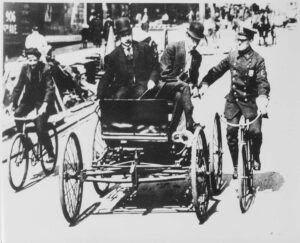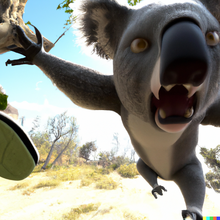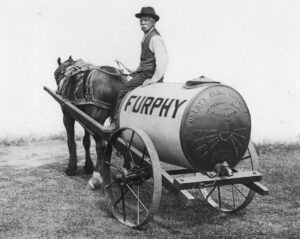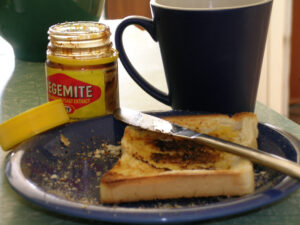by Debbie Burke
The saying “two countries divided by a common language” certainly applies to slang.
American and British slang are confusing enough. Throw in Australian slang and one needs a translator with a doctorate in linguistics to interpret.
Here’s an example I recently ran across in an Aussie news story: Dob in a hoon.
Translation: to report a driver who’s reckless and dangerous.
The story reported that the Greater Shepperton City Council and police have a “Dob in a Hoon” tip line where citizens can call in tips about dangerous drivers.
Being a writer fascinated by word origins, I headed down the rabbit hole to learn about this unusual phrase.
Hoon driving means driving recklessly, quickly, and irresponsibly. It includes street racing, fishtailing, burnouts, excessive noise to draw attention of bystanders.

Digging a little deeper into origins, I discovered the word hoon was coined by Aussie author Xavier Herbert in the 1930s and means a “hooligan” or “lout.”
What about the rest of the phrase dob in?
According to the Cambridge Dictionary, dob in means to “secretly tell someone in authority that someone else has done something wrong.”
Quick grammar review from Grammarly:
A transitive verb needs to transfer its action to something or someone—an object. In essence, transitive means “affecting something else.”
A transitive verb is one that makes sense only if it exerts its action on an object.
An intransitive verb will make sense without an object.
That makes dob in a transitive verb, where the verb action of dob in passes to the object noun hoon.
In Australian slang, dob in is comparable to the American slang terms rat out or squeal on.
The person who dobs in someone is often called a stool pigeon, canary, cheese eater, rat, informant, squealer, fink, narc.
While rooting around in the research rabbit hole, more Aussie slang sidetracked me. Here are a few examples:
If someone imbibes too much from the Bottle-O (liquor store) then gets behind the wheel, they could wind up riding in the Booze Bus (police vehicle that chases drunk drivers).
If you visit Australia, beware of the dreaded Drop Bear. This mythical beast is a carnivorous Koala-type bear that drops from trees to prey on creatures walking below.

Drop Bear attack
Photo credit: wikipedia
Aussies enjoy warning unsuspecting tourists about the Drop Bear, along with other fun Furphies (plural).
A Furphy (singular) is defined by Dictionary.com as “a false report or improbable story; rumor.”

Furphy water cart, ca 1905
Furphy is an actual brand name for traveling water tanks and sanitary disposal carts manufactured by the Furphy family of Victoria. During World War I, soldiers gathered around Furphies to gossip and spin yarns. That led to widespread slang usage of telling a furphy.
Do you think “sanitary disposal” could have inspired the term?
Those friendly, helpful Aussies also suggest repellants that supposedly protect from Drop Bear attacks. One method is to spread Vegemite behind the ears.
Vegemite isn’t slang but is an actual food product created and produced in Australia. It is made from leftover byproducts from brewing beer.
Here is a description of Vegemite from thetraveltart.com: “It looks like tar, has the consistency of thick paste, and has a salty/malty/yeasty taste to it that sounds just a bit weird but actually works – if you don’t plaster it too much!”
Applied behind the ears, Vegemite not only protects from Drop Bears, it makes a memorable cologne that’s also edible.
Those Aussies have a wicked sense of humor.


Photo credit: Sultan 11 cc-by-sa-4.0
The Drop Bear is similar to the North American “Jackalope”, another mythical creature with origins in folklore. Imagine a cross between an antelope and a jackrabbit.
Which brings me back to rabbits and falling down the rabbit hole.
Here’s an entertaining article by Elaine Zelby about the origins and usage of that particular slang.
TKZ emeritus Clare Langley-Hawthorne was raised in Australia. If Clare is online, maybe she’ll chime in with her favorite Aussie slang terms.
Pros of using slang in fiction:
- Adds authenticity;
- Adds regional color;
- Gives deeper dimension to characters and makes them unique and memorable.
Cons:
- Slang changes with the times. Twentieth century meaning may be totally different in the 21st century;
- The same slang can have different meanings in different cultures, causing reader confusion;
- May require explanation to the reader. Anything that takes them out of the story can be a problem;
- Overuse of slang is distracting and annoying.
A taste of slang in fiction goes a long way. Like Vegemite, don’t spread it too thickly.
~~~
This is my last post for 2023 before TKZ’s annual break. I’m honored to be part of this vibrant writing/reading community.
Warm wishes for a joyous holiday season with family and friends!
~~~
TKZers: How much slang do you use in your stories?
What is the most unusual slang term you’ve run across?
Do you research the origins of slang words?
Please share a few of your favorites.
~~~
Deep fakes lead to deep trouble in Debbie Burke’s thriller, Deep Fake Double Down, BookLIfe Prize Finalist. Click on the cover for the sales link.


The flying koala photo (i.e. drop bear) brought a smile to my face first thing this morning. Thanks. LOL!
I don’t think I use much slang in my work but when it does appear it is easy to determine the context. If I read ‘dob in a hoon’ it would for sure throw me out of the story because there’s definitely no figuring that one out without stopping to research it.
I don’t know if it’s considered slang, per se, but this weekend I heard a word used in conversation that I’d never heard before – trilemma (instead of dilemma). Trilemma = a situation in which a difficult choice has to be made between three alternatives, especially when these are equally undesirable.
Took me by surprise that although the term has apparently been around for quite a while, I’m just hearing it for the first time. I need to get out more. LOL!
Trilemma is a new one to me also, Brenda. Spellcheck put a squiggly red line under it so it’s probably not that widely used yet. Thanks for expanding our vocabulary.
What a fun blog post. Thanks for sharing. As I was reading the post about going down the rabbit hole, I remembered that we use something similar when we’re listening to someone talk and they “chase rabbit trails” instead of staying on topic. Fun for conversation, but annoying to me when I want a specific answer and the person talking takes forever to get to the point.
Thanks, Michelle. It was fun research. We all know people who chase rabbit trails before they finally get to the point. Depending on the storyteller, it can be fascinating or a frustrating bore.
My favorite slang story is from a retired St. Louis County Juvenile Officer. When speaking to juveniles they always asked for explanations of slang terms. I discovered in most of St. Louis County a “narc” was a narcotics detective. In deep south county a narc was a drug user.
Important distinction.
Alan, great example of how slang meanings can change from one locale to another. In southern CA where I grew up, narc meant a cop, often undercover.
Very interesting post, Debbie.
I loved your discussion of “Dob in a hoon.” Besides a transitive verb, “dob in” is a phrasal verb, like we discussed here on Friday. And, having the last name Hooley, I’m appreciative that they use “hoon” instead of “hooligan.”
I “go light” on use of slang in my writing. Having multiple teenagers, I have to use some that is appropriate for the setting.
The most amusing slang term I’ve heard in our neck of the woods is “head warsh” for shampooing one’s hair.
Thanks for all your wonderful posts over the past year. Wishing you and yours a wonderful holiday season!
Steve, thanks for tying “dob in” as a phrasal verb also.
Hooligan touched a nerve, eh? (BTW, “eh” is Canadian slang).
“Warsh” seems to be a regional pronunciation mostly in the west/midwest. I’ve always added an “R” to warsh and Warshington and get kidded about it. To me, it sounds normal.
There’s another rabbit hole to explore: how did R get inserted into wash?
Merry Christmas to you and your family, Steve!
Fun post, Debbie, packed with fascinating info about Australian slang. If I ever do make it to Down Under, I’ll be sure and not fall for the Drop Bear joke, though it might be fun to play along a bit. Our classic American version is of the (in)famous Snipe Hunt. I was actually surprised to learn as an adult that there’s an actual family of birds called Snipe, but the object of the Snipe Hunt is of course a mythical creature of sorts.
Growing up, “narc” was slang for an informant—to “narc on” meant to “rat out.” Often used by “stoner” types.
Hope you have a wonderful holiday season!
What??? Snipes aren’t real??? Dale, you shattered my illusions. Next you’ll tell me there is no Santa Claus.
“Narc on” is another good example of a verb that’s both transitive and phrasal.
Happy Holidays to you and your family, Dale!
Love me me some Yiddish: kvetch, chutzpah, plotz, schmutz, bupkis, etc. They sound like what they mean!
It’s tough to stay current with American slang, it changes so fast, esp. among the kiddies. It can sound dated in our fiction.
OTOH, some things come back into style. I had a convo with a Gen Z customer service rep who was probably in her mid 20s. When everything was set up to my satisfaction, she said, “Groovy like a drive-in movie.” Love it! I’m using it.
Jim, great point that everything old is new again. It’s fun to lay old slang cliches on a Gen Zer and see the look of surprise b/c they’re never heard it before. They think I’m brilliant for coming up with a “new” expression. Little do they know.
What a fun post, Debbie. If we ever travel to Australia, I’ll stock up on Vegemite. 🙂
I haven’t used much slang in my works. But there are a few slang terms I love. A friend of ours who had a Scottish background used to say “Hoot man.” I think it’s a Scottish way of “Hey you.” We use it now and then instead of “Yikes!”
Jim brought up the rich Yiddish tradition of slang. Two that i love are “schnorrer” (the guy who visits and overstays his welcome) and “chazer fissel” (literally means “pig’s foot” but the real meaning is “a person who pretends to be religious but is not.” The etymology of that one is cool.
Thank you, Debbie, for all of your wonderful posts over the past year. Happy holidays to you and your family.
Thanks for those fun additions, Kay, and your kind words.
May your holidays be filled with family and love. See you next year.
RE: Vegemite: When I went to a Bonanza fandom gathering years ago, someone from Australia brought some vegemite and I tried it. I didn’t ask for more. LOL! But then I’m a persnickety eater.
Around here we usually say, “chase a rabbit” instead of rabbit trails. I often have an older character say things from the past, but they can get by with it.
Thanks to you and all the TKZers for the time you invest in this blog. It’s the only one I read every single day. 🙂
Patricia, your encouragement is music to our ears. We’re here b/c we love to share info with fellow writers.
I was expecting “rizz,” the new word of the year according to the OXFORD ENGLISH DICTIONARY. The word means being sexually attractive and is supposed from “charisma.” MERRIAM WEBSTER chose “authentic” with its regular meaning, but it’s become something to aspire to in this fake world.
Marilynn, my reply shows up farther down.
Fun post, Debbie! The only slang words I’ve used (so far) are the ones teenagers use, and like JSB says, they go in and out of trending.
I drive my husband crazy sometimes. We’ll be talking and many times I will interrupt the conversation with, “I wonder why they call it that”; I’m fascinated by word/slang origins. Sometimes, he’ll be explaining some obscure process with tools, and I’ll stop him with, “Why is it called a ___________?” His answer?
Who cares? 🙂
One slang word I just like the sound of as it rolls off the tongue, originating in the PNW (my stomping grounds) is: Potlatch. Most sources say it’s where the word potluck came from.
Potlatch just sounds better. Why?
Because in my pea brain, I’m thinking, “I don’t want to rely on luck where there’s a lot of food being served.” Ha!
Deb, thanks for contributing potlatch. A not-so-fun fact: in 1885, the Canadian government made potlatch illegal. They viewed the cultural tradition of feasts and giving gifts by Native peoples as a threat to assimilating them into European culture.
Merry Christmas to you and your family, Deb.
Marilynn, if I remember correctly, Elaine mentioned rizz in her post a couple of months ago.
In this fake world, authentic is an excellent quality that’s too rare.
Fascinating, Debbie! I’ve heard of vegemite from an Aussie show we used to watch, but had no idea what was in it. They have a fabulous sense of humor!
I drop the occasional New England slang in my books, but I try not to overdo it. Like you said, a little goes a long way.
Sue, not only Aussies have a great sense of humor, they recycle leftover gunk from beer brewing. I’ve heard of people eating mash left after making moonshine. Neither sounds all that appetizing but what do I know?